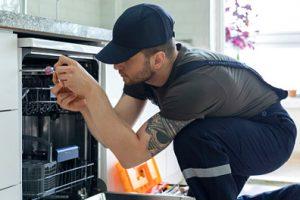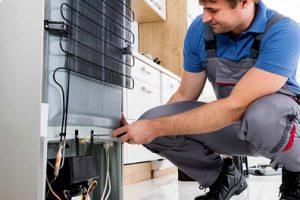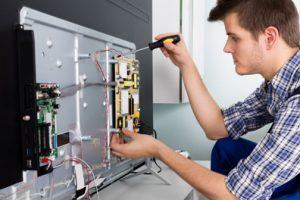Having a dishwasher that won’t start can be a frustrating experience. A broken dishwasher disrupts the daily routine and can lead to a pile-up of dirty dishes. But don’t worry, fixing a dishwasher that won’t start is often simpler than you might think. In this guide, we’ll walk you through the common causes and solutions for a dishwasher that won’t start. If you need further assistance, don’t hesitate to contact us at 0567750003.
1. Check the Power Supply
The first step in troubleshooting a dishwasher that won’t start is to check the power supply. A dishwasher that won’t start might simply be due to a lack of power.
Ensure the Dishwasher is Plugged In
It might sound basic, but ensure your dishwasher is properly plugged into the power outlet. Sometimes, the plug might come loose or get disconnected. Check behind your dishwasher to make sure it’s securely connected.
Inspect the Circuit Breaker
If your dishwasher is plugged in but still won’t start, the next step is to check your home’s circuit breaker. Locate your electrical panel and look for the switch corresponding to your dishwasher. If it’s in the “off” position, switch it back to “on.” This could resolve the issue if there was an electrical surge or overload.
Check for a Faulty Outlet
Try plugging another appliance into the same outlet to see if it works. If it doesn’t, then you might have a faulty outlet. You may need to contact an electrician to fix the outlet.
Inspect the Door Latch
Another common issue for a dishwasher that won’t start is the door latch. The dishwasher won’t start if the door isn’t properly closed.
Examine the Door Latch
Open the dishwasher door and check the latch. If it appears damaged or doesn’t close properly, this might be the reason why your dishwasher won’t start. A broken door latch will need to be replaced.
Ensure the Door is Fully Closed
Sometimes, the door may seem closed but isn’t latched properly. Make sure there are no obstructions preventing the door from closing completely.
2. Evaluate the Control Panel

If your dishwasher still won’t start after checking the power supply and door latch, the issue might be with the control panel.
Reset the Dishwasher
Sometimes, simply resetting your dishwasher can fix the problem. Consult your dishwasher’s manual to find the reset button or instructions on how to reset it. This can often resolve software glitches that might be preventing the dishwasher from starting.
Inspect for Error Codes
Modern dishwashers often display error codes on the control panel. Refer to your user manual to decode these error messages. These codes can give you insight into what might be wrong with your dishwasher that won’t start.
Check the Control Lock
Many dishwashers have a control lock feature that prevents the dishwasher from starting accidentally. Ensure that the control lock isn’t activated. Refer to your manual to find out how to disable it if it is.
3. Assess the Water Supply
A dishwasher that won’t start could be due to a problem with the water supply. Dishwashers need water to function, and if there’s no water supply, they won’t start.
Ensure the Water Supply is On
Check under your sink to ensure the water supply valve is open. If it’s closed, turn it on to allow water to flow into the dishwasher.
Inspect the Water Inlet Valve
The water inlet valve controls the flow of water into your dishwasher. If this valve is faulty, your dishwasher won’t start. You can test the valve using a multimeter to check for continuity. If the valve is defective, it will need to be replaced.
Check for Kinks in the Hose
Ensure the water supply hose isn’t kinked or obstructed. A kinked hose can prevent water from reaching the dishwasher, causing it not to start. Straighten out any kinks and ensure the hose is properly connected.
4. Examine Internal Components
If you’ve gone through the previous steps and your dishwasher still won’t start, it might be time to examine some of the internal components.
Inspect the Thermal Fuse
The thermal fuse protects the dishwasher from overheating. If this fuse is blown, your dishwasher won’t start. Use a multimeter to test the thermal fuse for continuity. If it’s blown, it will need to be replaced.
Check the Motor Start Relay
The motor start relay sends power to the dishwasher’s motor. If this relay is defective, the dishwasher won’t start. Again, you can test it with a multimeter to check for continuity.
Evaluate the Timer
The timer controls the electrical components in the dishwasher. If the timer is malfunctioning, it might prevent the dishwasher from starting. Testing the timer requires a multimeter and a basic understanding of how to use it. If you’re unsure, it’s best to consult a professional.
5. Seek Professional Help

If you’ve gone through all these steps and your dishwasher still won’t start, it might be time to seek professional help. Sometimes, the issue can be more complex and require specialized knowledge and tools.
Contact a Professional Technician
A professional technician will have the expertise and tools to diagnose and fix your dishwasher that won’t start. They can identify issues that might not be obvious and provide a reliable solution.
Call Us for Assistance
If you’re in need of professional help, don’t hesitate to contact us at 0567750003. Our team of experts is ready to assist you with your dishwasher issues and get it running smoothly again.
Conclusion
Dealing with a dishwasher that won’t start can be inconvenient, but by following these steps, you can often diagnose and fix the problem yourself. Remember to always ensure the power supply is intact, the door latch is secure, and the water supply is functioning properly. If the issue persists, don’t hesitate to seek professional help. Your dishwasher is an essential appliance, and getting it back in working order should be a priority.
By following these tips and ensuring you maintain your dishwasher regularly, you can prevent future issues and keep your appliance running efficiently. For any further assistance, remember, you can always reach out to us at 0567750003.







